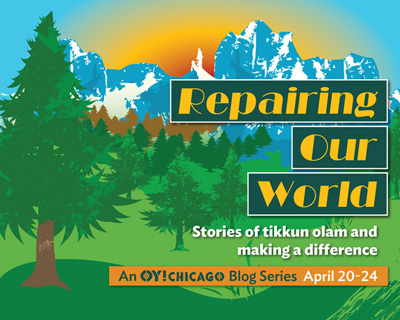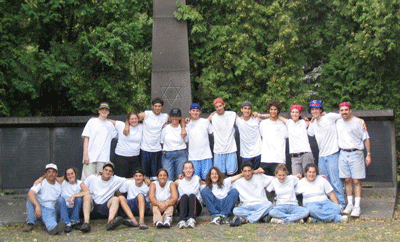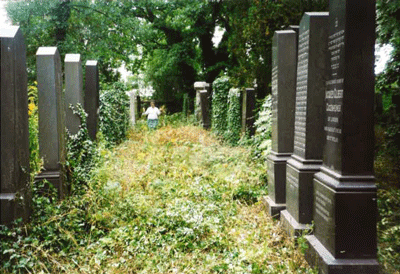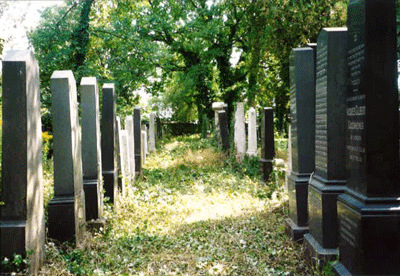Remembering is Repairing
Permanent link All Posts
I think I hit my all-time tikkun olam high when I was 16. For the first time in my life, I left the North American continent and, with 16 other teenagers from my synagogue, traveled to the Czech Republic. I don’t think any of us quite understood the sheer holiness of the task before us, but that would quickly change, and change us for good.

Our group at the cemetery. I’m in the back right in the dorky Cubs floppy hat.
Our quest: visit the tiny community of Kolin, the original home of a Torah scroll that survived the Holocaust and came into the care of our synagogue in the northern suburbs of Chicago. There stood a Jewish cemetery, overgrown with weeds, the names on the headstones shrouded in rampant vines, a piece of European Jewish history that – like much else after World War II – had been discarded and forgotten.
After touring Prague for a few days, we arrived in Kolin armed with gardening tools and a fierce sense of responsibility. We were the third contingent of youth from our synagogue to make the journey, and it had been three years since the last trip – plenty of time for nature to erase the hard work of our predecessors.
Our focus and determination to clear off as many graves as we could kept much of those days a blur, but I will never forget reading names, names that might otherwise have been forgotten, or huddling together to say kaddish at the graveside of people who had no one left to say kaddish for them. It was on this trip that I learned firsthand the meaning of the Pirkei Avot quote, lo alecha hamlacha ligmor, v’lo atah ben chorin l’hibateil mimenah – “it’s not your duty to complete the task, but neither are you free to desist from it.” The solace in knowing that time would undo all our labor was that another group of teens would come along and continue it, and our legacy would endure.

The row of graves a few of us worked to clear early on in the day

The row of graves after we finished clearing
Well, three years later our synagogue teens returned, and what they found nobody quite expected. The cemetery had been completely cleaned up by the proper Czech authorities. When I heard the news, I chose to believe it was the work of our previous trips that finally made the someone take notice and commit to maintaining the cemetery. This was a different feeling than simply engaging in a couple days of mitzvot. This was what raising awareness and affecting change felt like. This was tikkun olam.
As far as making a difference goes, I think most of the 17 of us who unearthed a part of our Jewish identities while cutting, pulling and scraping the cemetery clear of weeds would still rank that trip as the most powerful volunteer experience of our lives. Yet more than a decade later, many of us have chosen difference-making, fulfilling paths. Four of us from that trip, myself included, became youth group advisors (one led a future trip to Kolin), a handful of us work for Jewish non-profits (again, myself included) and a few have chosen helping professions. And that’s just what I know, or what Facebook and LinkedIn tell me.
Reflecting on the trip today, I realize that repairing the world is not about accruing successful and meaningful volunteer experiences, but about making a commitment to the work that needs to be done in this world once you see a part of it that is broken that you know you can help fix. I’m a little sad that the current upkeep of the Kolin cemetery will prevent future participants from sharing in my same experience, but to say it takes away from the tikkun olam value of the trip would be missing the point. Witnessing, experiencing – and in this case, remembering – are all part of that commitment.
On Yom HaShoah last week, my old youth group advisor – old as in a long time ago, not old as in age (you’re welcome, Larry!) – shared our group photo from the trip. His intent was to honor the day by remembering the work we did to remember others; what I remembered was how proud I was of that experience, of how it affected me in a way I did not know I could be moved. More importantly I remembered the difference I made that summer, the differences (however smaller) I have made since, and the differences I am still capable of making.
This June will mark the seventh Congregation BJBE youth trip to Kolin, and my cousin will become the fourth member of my family to help keep alive the memory of the Jewish community there. He too will pray in the Kolin synagogue, now a museum, and feel the connection to these people whose lives were stripped away from them. Hopefully, he too will look back on his path 12 years later and realize he’s done more to repair the world than he thought.
To read more posts in the "Repairing Our World" blog series, click here.



.jpg)



